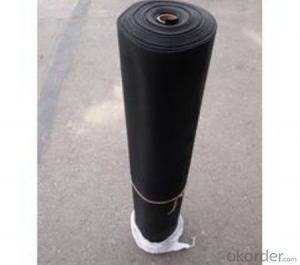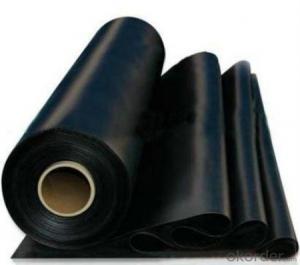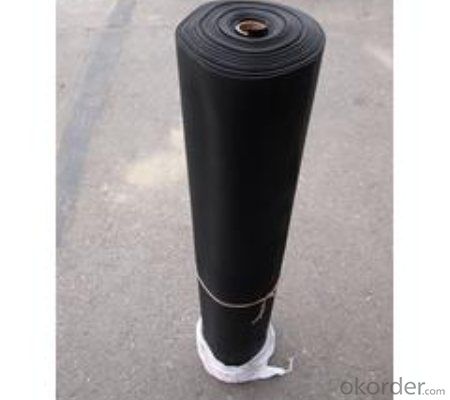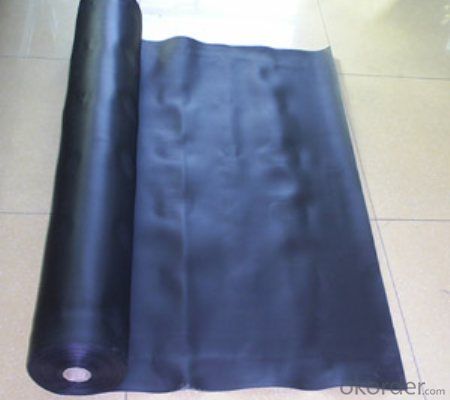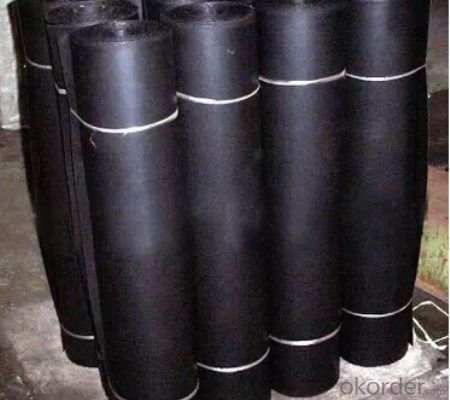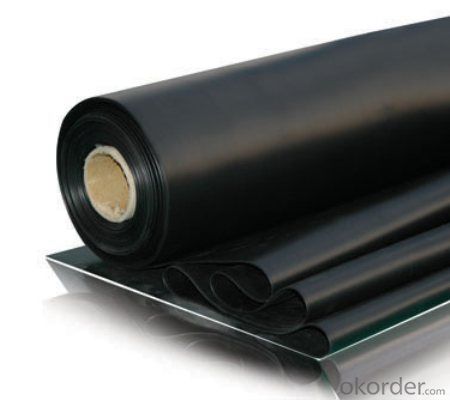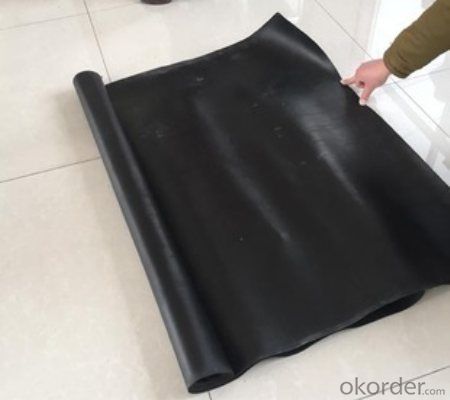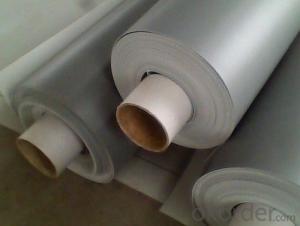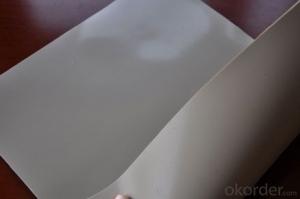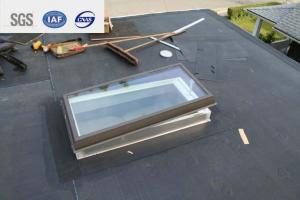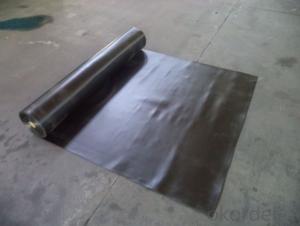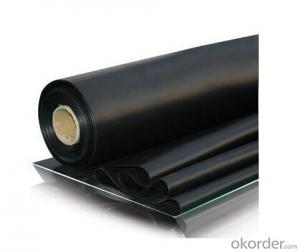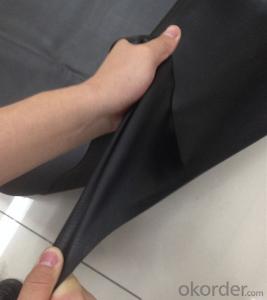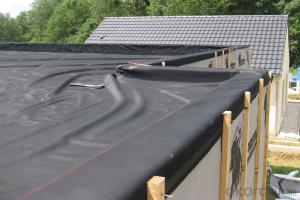EPDM Membrane Vulcanization Thickness 1.2MM for Waterproof System
- Loading Port:
- Qingdao
- Payment Terms:
- TT or LC
- Min Order Qty:
- 8000 m²
- Supply Capability:
- 100000 m²/month
OKorder Service Pledge
OKorder Financial Service
You Might Also Like
EPDM Membrane Vulcanization 1.2 mmfor Waterproof System
Description Of EPDM Membrane Vulcanization1.2 mm:
1. EPDM 1.2 mm membrane is made from ternary ethylene-propylene rubber, which is for waterproofing of exposed and non-exposed applications.
2. EPDM 1.2 mm membrane production adopts the world-advanced equipment of cold feeding extrusion and continuous vulcanization technology.
3. EPDM 1.2 mm is of high elasticity among high polymer waterproof materials and becomes a world-popular waterproofing material.
Main Features of EPDM Vulcanization EPDM Membrane1.2 mm:
1. Excellent physical and mechanical performance
2. High tearing resistance
3. Good deformation adaptability
4. High puncture resistance
5. High aging resistance
6. UV resistance
Specifications of EPDM Vulcanization Membrane1.2 mm:
Material | Ternary Ethylene-Propylene rubber |
Size | 1.2m (width)*20m (length) or customized, weldable type 2.05m or 4m width |
Thick | 1.2mm, 1.5mm, 2.0mm |
Type | Vulcanized |
Pattern | Non-reinforced (homogeneous) |
Certificate | ISO9001/14001 |
Applications of EPDM Rubber Waterproof Membrane1.2 mm:
1.Roofs, Basement, Toilets
2. Industrial and civil building waterproofing
3. Geosynthetic liner for swimming pool, channels, irrigation system
4. Especially suitable for projects with high requirements in durability, anti-corrosion and deformation.
IMages of EPDM Vulcanization Membrane:
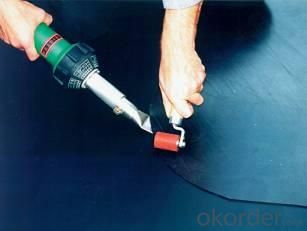
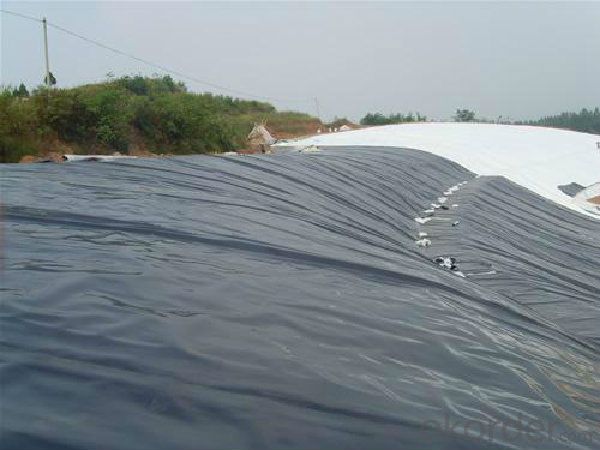
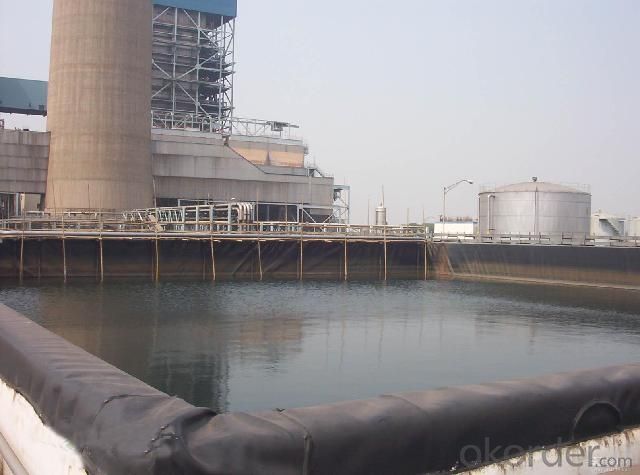
FAQ:
1. What are we supplying?
We are specialized in producing Colorful Asphalt Roof Shingle, SBS/APP modified bitumen waterproof membrane, Self adhesive bitumen waterproof membrane, PVC waterproofing membrane, EPDM rubber roofing membrane, Single Component Polyurethane Waterproof Coating, and Spray Polyurea Waterproof Coating
.
2. How Many years experience do we have?
We have been exported to more than 15 countries in the past 10 years.
3. How long do we usually reply your request?
We always reply our customer within 12 hours.
- Q: Is a waterproofing membrane resistant to algae or moss growth?
- Yes, a waterproofing membrane is typically resistant to algae or moss growth. The materials used in waterproofing membranes are designed to prevent the growth of organic matter, including algae and moss.
- Q: Can a waterproofing membrane be used for concrete tank linings?
- Concrete tank linings can make use of waterproofing membranes, which are frequently employed in construction to obstruct water penetration and offer a protective shield. By applying a waterproofing membrane to the inner surfaces of a concrete tank, the infiltration of water and subsequent harm can be effectively averted. This becomes especially crucial for tanks that store fluids or chemicals, as any leakage can result in contamination or structural decay. By utilizing a waterproofing membrane, the tank can be shielded against water ingress, guaranteeing its durability and preserving its structural soundness.
- Q: Can a waterproofing membrane be used for a stadium seating area?
- Yes, a waterproofing membrane can be used for a stadium seating area. Waterproofing membranes are designed to provide a barrier against water penetration and are commonly used in various construction projects, including stadiums. By applying a waterproofing membrane to the seating area, it helps prevent water damage, mold growth, and deterioration caused by moisture. This ensures the longevity and durability of the seating area, protecting it from potential water-related issues.
- Q: Can a waterproofing membrane be used on steel surfaces?
- Yes, a waterproofing membrane can be used on steel surfaces. Waterproofing membranes are designed to provide a protective barrier against water and moisture, and they can effectively adhere to and seal steel surfaces, preventing water penetration and potential damage.
- Q: Can a waterproofing membrane be used in commercial buildings?
- Indeed, it is possible to utilize a waterproofing membrane in commercial establishments. Waterproofing membranes serve the purpose of safeguarding diverse sections of a building, encompassing roofs, foundations, and basements, against water infiltration. In the case of commercial buildings, where the likelihood of water harm is heightened due to larger surface areas, increased foot traffic, and intricate architectural designs, waterproofing membranes prove to be a viable solution. These membranes are specially crafted to establish a protective barrier against water, thereby averting leaks, moisture, and potential structural harm. Furthermore, the integration of waterproofing membranes contributes to the longevity of the building by reducing the risk of deterioration resulting from exposure to water. Consequently, the incorporation of a waterproofing membrane system in commercial establishments aids in maintaining a secure and dry environment, safeguarding valuable assets, and optimizing the lifespan of the structure.
- Q: Can waterproofing membranes be used on utility vaults?
- Utility vaults, which are commonly found underground and contain vital utility equipment like electrical transformers, water meters, and communication systems, can benefit from the use of waterproofing membranes. These structures are vulnerable to water infiltration, which can harm the equipment and disrupt its operation. To prevent water from entering utility vaults, waterproofing membranes are often employed. These membranes, typically composed of robust materials like rubber, PVC, or modified bitumen, form an impenetrable barrier against moisture. Applied to the walls and floors of the vault, they establish a tight seal that wards off any water seepage. By employing waterproofing membranes on utility vaults, the risk of water damage is significantly diminished. This safeguard ensures that the equipment housed within remains functional and undamaged for an extended period. Additionally, these membranes offer protection against other potential issues, such as leaks, corrosion, and chemical damage. However, it is crucial to note that the proper preparation of the surface and correct installation techniques are essential for a successful and enduring waterproofing system on utility vaults. Therefore, it is advisable to consult a professional waterproofing contractor with experience in working on utility vaults to achieve optimal results.
- Q: Can a waterproofing membrane be used for a school?
- Certainly! A school can indeed benefit from the use of a waterproofing membrane. In construction projects, like schools, waterproofing membranes are commonly employed to shield the building and its inhabitants from water damage. These membranes are typically applied to areas like basements, roofs, and foundation walls to prevent water infiltration. By serving as a barrier against moisture, a waterproofing membrane ensures a dry and secure environment within the school, safeguarding against potential structural destruction, mold growth, and other water-related problems. Furthermore, waterproofing membranes often offer supplementary advantages such as insulation and soundproofing, which can contribute to a pleasant and conducive learning atmosphere for students and staff.
- Q: Are waterproofing membranes resistant to battery acid?
- Yes, waterproofing membranes are generally resistant to battery acid.
- Q: Can a waterproofing membrane be used on vinyl surfaces?
- Yes, a waterproofing membrane can be used on vinyl surfaces. The membrane serves as a protective layer that prevents water from penetrating and damaging the vinyl material.
- Q: Can a waterproofing membrane be used in bridge decks or roadways?
- Yes, a waterproofing membrane can be used in bridge decks or roadways. A waterproofing membrane is a protective layer that is applied to the surface of a structure to prevent water infiltration, thereby increasing the lifespan of the structure. In the case of bridge decks and roadways, which are constantly exposed to harsh weather conditions and heavy traffic, the use of a waterproofing membrane is crucial. Bridge decks and roadways are vulnerable to damage caused by water penetration, such as corrosion of steel reinforcements and the deterioration of concrete. By applying a waterproofing membrane, a barrier is created that prevents water from seeping into the structural elements, reducing the risk of corrosion and extending the durability of the bridge or roadway. Furthermore, a waterproofing membrane can also help to prevent the formation of cracks and potholes, which are often caused by the freeze-thaw cycle and the penetration of water. By keeping the surface of the bridge deck or roadway dry, the membrane helps to maintain its structural integrity and prevent the need for costly repairs or premature replacement. It is worth noting that when considering the use of a waterproofing membrane in bridge decks or roadways, factors such as material selection, installation techniques, and maintenance should be carefully considered. The chosen membrane should be compatible with the materials used in the construction of the bridge or roadway, and the installation process must be carried out properly to ensure a watertight seal. Regular maintenance and inspections should also be conducted to identify any potential issues or damage to the membrane, allowing for timely repairs and ensuring its effectiveness over time. Overall, the use of a waterproofing membrane in bridge decks or roadways is an effective solution to protect against water damage and extend the lifespan of these critical infrastructure elements.
Send your message to us
EPDM Membrane Vulcanization Thickness 1.2MM for Waterproof System
- Loading Port:
- Qingdao
- Payment Terms:
- TT or LC
- Min Order Qty:
- 8000 m²
- Supply Capability:
- 100000 m²/month
OKorder Service Pledge
OKorder Financial Service
Similar products
Hot products
Hot Searches
Related keywords
